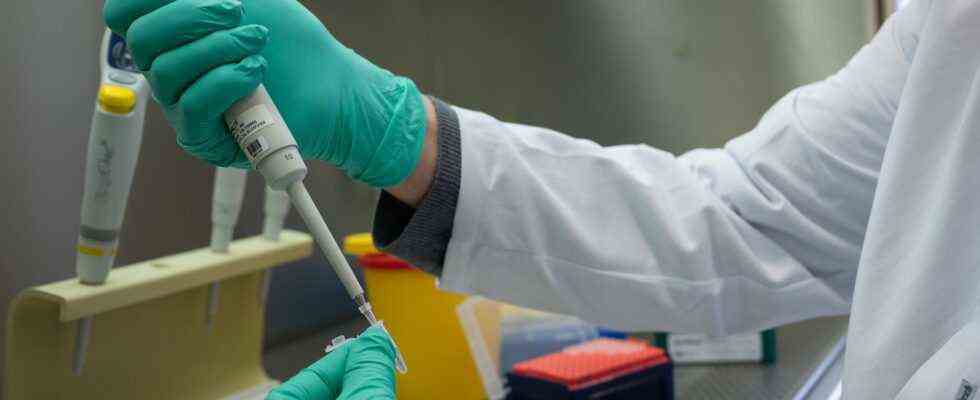Status: 04.09.2021 11:38 a.m.
The RKI has reported 10,853 new corona infections and 24 new deaths. The incidence is now 80.2. In view of the development, Health Minister Spahn defended booster vaccinations for vulnerable groups.
The nationwide seven-day incidence of new corona infections rose again slightly. According to the Robert Koch Institute (RKI), it is now 80.7. On Friday the value was 80.2 and on Saturday of last week it was 72.1. 10,835 new infections were reported within 24 hours. According to the information, 24 other people died in connection with a corona infection. The number of deaths related to the virus in Germany since the beginning of the pandemic is now 92,325.
According to the RKI, a total of 3,995,188 infections with Sars-CoV-2 were detected. The number of those who have recovered is therefore around 3,763,600. On weekends, the number of new infections reported is usually lower than the weekly average because fewer tests are then carried out and fewer test results are transmitted.
Spahn defends third party vaccinations
In view of the steadily increasing numbers for weeks, Federal Health Minister Jens Spahn defended the approach of the federal and state governments to offer booster vaccinations for seniors and immunocompromised people against Covid-19 before an official recommendation by the Standing Vaccination Commission (STIKO). “I don’t want to wait until people die again in the nursing homes,” he told the “editorial network Germany”.
Spahn described the start of the booster vaccinations this month as “forward-looking, precautionary action. This is how we protect human lives”. The minister argued that there are already many studies that clearly show that booster vaccinations are useful for the very old, those in need of care and people with certain immune diseases. Since Germany has enough corona vaccine for such booster vaccinations, it should “act”.
Criticism from patient advocates
Eugen Brysch from the Patient Protection Foundation objected that forward-looking and precautionary action looked different. It is wrong to start with the booster vaccinations without waiting for the recommendation of the STIKO. “Politics is again torpedoing the scientific expertise of independent vaccination experts,” Brysch told the epd news agency. Medical facts alone should decide when the third vaccination is right. “To do this, the immune status of very old and seriously ill people must first be taken into account,” argued Brysch. That also strengthens the vaccination campaign.
Several federal states have started offering people in need of care, those over 80 years of age and people with immunodeficiency the third vaccination if the last one was at least six months ago, because after this period the effect can significantly decrease. According to its boss Thomas Mertens, the STIKO is planning a recommendation as soon as possible.
The number of people vaccinated is increasing only slowly
Spahn also criticized the current speed of the first and second vaccinations. The vaccination rate is still too low to prevent overloading the health system. The numbers clearly showed that the vaccinations were effective. Unvaccinated people were more than ten times more likely to be infected than those who were vaccinated. Around 90 percent of Covid 19 patients in intensive care units are not vaccinated. “We are currently seeing a pandemic for the unvaccinated,” emphasized the CDU politician.
In Germany, vaccination fatigue is becoming more and more common in the corona pandemic. According to the latest weekly report from the Robert Koch Institute on Thursday evening, the proportion of fully immunized German citizens was around 61 percent compared to the previous week (59 percent).
Intensive care physicians warn of autumn
In view of the vaccination fatigue, German intensive care physicians warn of a renewed high utilization of the clinics in the fall. “If we do not raise the vaccination rate significantly by October, we will get a really strong increase in corona cases in the intensive care units in autumn,” said Christian Karagiannidis, President of the German Society for Internal Intensive Care Medicine and Emergency Medicine, the “Augsburger Allgemeine”.
He worries about the time from October and November. “We can already see how much the Delta variant is spreading in closed rooms,” said Karagiannidis. The difference between a ten percent higher or lower vaccination rate is enormous when it comes to the effect on the intensive care units. With a vaccination rate of 80 percent there are twice as many people at risk as with a vaccination rate of 90 percent, with a vaccination rate of 70 percent three times as many. That is why a ten percent higher vaccination rate helps the intensive care units a lot.

